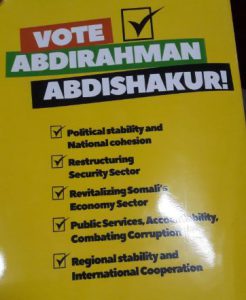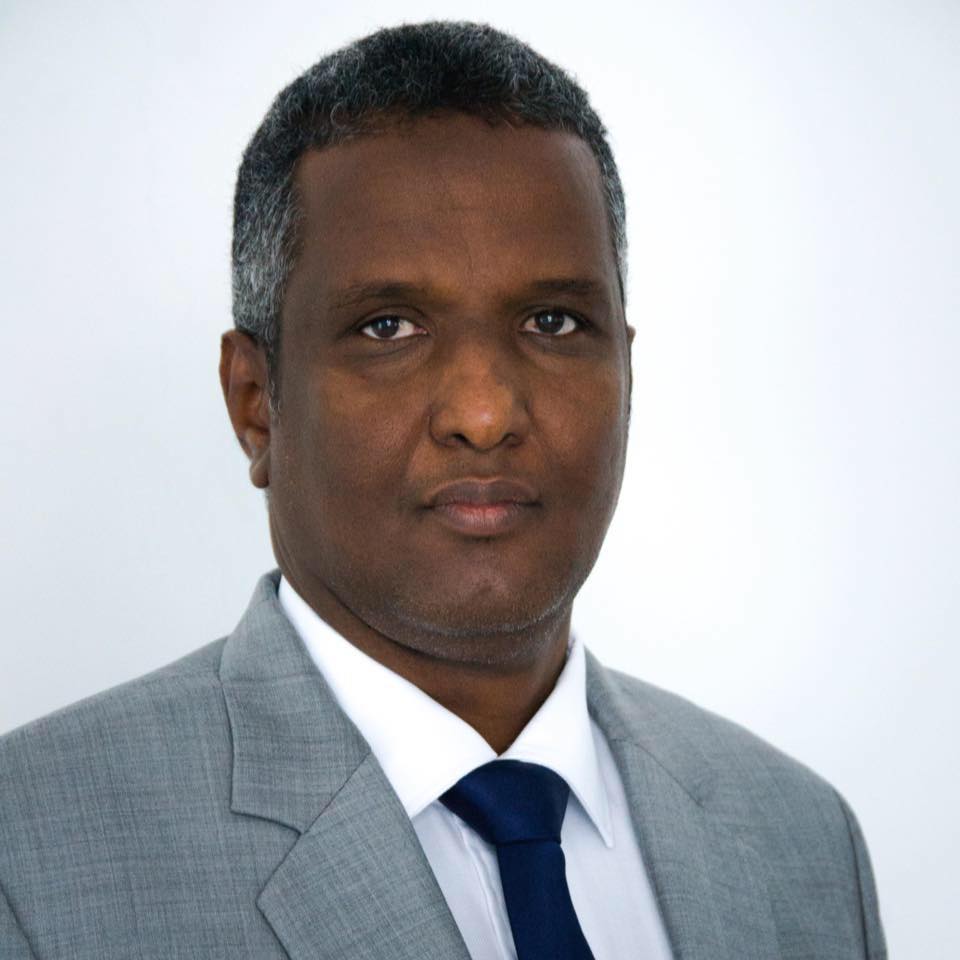by Jeff Mwaura, jeff@alleastafrica.com
NAIROBI – Having launched his groundbreaking political manifesto, Abdirahman Abdishakur, a leading Somali presidential candidate can count on the momentum his campaign is already gaining, thanks to his promises of turning the impoverished horn of Africa nation that largely relies on donors’ funding into a self-reliant powerhouse.
The flag-bearer of Wadajir Party as well as the former Planning and International Cooperation Minister and Special Advisor to the United Nations Special Representative of the Secretary General says that his manifesto that addresses wider issues in Somalia was prepared in tandem with Somalia’s 2016 vision.
According to his new manifesto, his government would work towards political stability, recovery and security, key important issues that any Somali leader hardly tried to address before.
laying out his vision to match his incoming campaign slogan, ‘Make Somalia Self-reliant.’, Abdishakur says his government would also focus on public services accountability, combatting corruption, regional stability and international cooperation, central issues that my government will focus to address.

He’s among dozens of candidates including the incumbent president Hassan Sheikh Mohamud who is trying to defend his seat, in the face of accusations of performing below par.
“Somalia had lost a lot of opportunities because of wanton corruption, so it’s my desire to turn the page for the better.” The 48-year-old politician said.
As candidates draw battle lines for the country’s top seat campaign fight, Abdishakur’s proposal for good governance with a unique manifesto attracted cheers and prospect of support from across the political spectrum.
Somali government has recently announced that the election of a new president will take place on Oct. 30. The government had previously scheduled presidential elections in August, before the incumbent president’s term expires.
According to Somalia’s Provisional Federal Constitution, adopted in 2012, the mandates of the Somali Federal Parliament and of the government would come to an end in August and September 2016, respectively.
The international community which is spearheading efforts aimed at restoring peace and order into the Somalia which is recovering from decades of war mandated the current government to lead the country into general elections following the election of President Hassan Sheikh Mohamud, a new parliament and the adoption of a new constitution in 2012.
ABDIRAHMAN ABDISHAKUR WARSAME’S PROFILE
I was born 1968 to an ordinary family and lived an ordinary life, sharing in the common joys and hardships of life. I left the country in 1993 to pursue studies abroad. I graduated from the International University of Africa in 1997 with a degree of law and I did Master of Laws in 2000 at National University of Malaysia. I settled UK in 2001 and it was there that I developed an interest in social and community work. I was an active member of the Somali Diaspora community, run community welfare and media outreach projects and managed the Muslim Welfare Centre in London.
Burdened by the crises in our homeland, like many of my peers and members of my generation I saw my role as that of a catalyst for changing perceptions; reviving hope; raising the political consciousness of our people and harnessing their energy to serve the goals of peace, enlightened politics and national reconciliation. I look back to those years of community activism in the UK with great pride. My conviction and faith in the intrinsic goodness of our people and hope in their capacity to surmount their challenges was reinforced. I formed great professional and personal friendships; accumulated many of the key leadership and managerial experiences; learnt valuable political lessons and picked the set of skills which I would later draw upon when I left the UK to join active politics in Somalia in ….
I served as Chief Negotiator and Deputy Chairman of the Alliance for Reliberation of Somalia during the landmark Djibouti talks (2008-2009) which ultimately led to the formation of the current TFG. It was a difficult period and my task was especially tricky. I had to constantly navigate around powerful vested interests and seek to harmonize and narrow viewpoints. It was there I learnt one of the salient truths of modern politics – that politics cannot be conducted as a zero-sum game. It was about making painful compromises and concessions in the interest of achieving a workable formula to advance of our collective and strategic goals – peace, national reconciliation and an inclusive, democratic and functional government.
It was in the interest of advancing these goals that I agreed in 2009 to join the post-Djibouti government as an MP and in the cabinet as Planning and International Cooperation Minister. Despite my eagerness to serve and despite sharing in the general optimism our country had turned a corner, I quickly realized to my huge disappointment we had made a wrong turn and veered off course. We were not making any headway. Our political project had stalled. We were increasingly fragmented and factionalized. We poorly-led and mismanaged the ship of government had run aground. Frustrated by my inability to influence or change things and unable to stomach all what was happening or tacitly take responsibility, I decided to resign.
Despite leaving government at end of 2010, I have remained an ordinary member of parliament. I continue to preach and practice constructive politics – maintaining respect for the state and its institutions; engaging in dialogue with civic groups and political formations; and working with other like-minded brothers and sisters to seek solutions to our crises and help advance the reform agenda.
©Alleastafrica, all rights reserved
Email: info@alleastafrica.com



